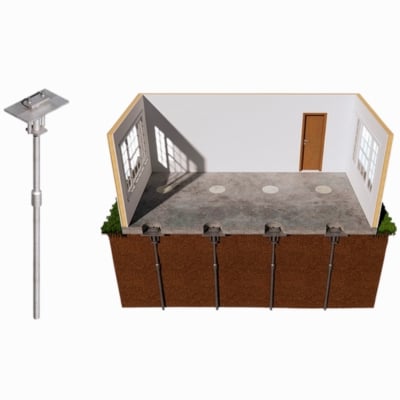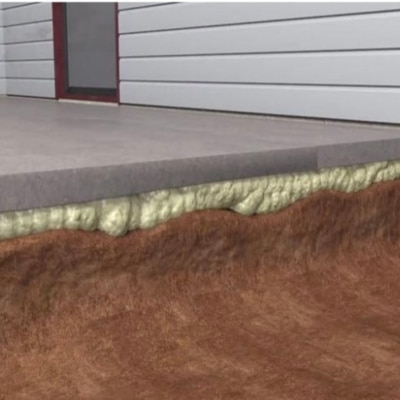Cracks in Basement Floor
Spotting cracks in your basement floor is a clear sign of a problem; catching them early can prevent further damage. Look out for wrinkles or bulges in carpeted basements, as they could indicate uneven flooring caused by shifting grounds.

Fixing Cracks in Basement Floor in Northern Virginia, Shenandoah Valley, North Central Virginia, and West Virginia
Have you begun seeing cracks in your basement floor? Cracks in basement floor refer to fractures that appear on the concrete surface of your basement floor. They can manifest as straight lines, spiderweb patterns, or irregular shapes.
These cracks may signal serious issues, such as your home settling. Ignoring these will prompt them to expand gradually, resulting in more complications in other areas or even permanent damage to your home’s foundation, which can be dangerous.
If you’re struggling with this issue, it can be tough to determine what course of action is needed. Contact a LUX Foundation Solutions expert today to schedule your free estimate and learn more. Northern Virginia, Shenandoah Valley, North Central Virginia, and West Virginia.
Do These Cracks in Basement Floor Signs Seem Familiar?
The symptoms
If you suspect foundation problems, watch out for the following signs of cracks in basement floor:
- Visible cracks
- Uneven or sloping floor
- Doors and windows that stick or no longer close properly
- Gaps between walls and ceilings
- Cracks in drywall or along window and door frames
- Water seeping through basement walls or floor
Seeing any signs of a crack in your basement floor can instantly raise many questions. Should I be worried about this crack on my floor? What causes cracks in the basement floor? To what extent do cracks on a basement floor become serious?
If you fear the structural integrity of your home, it’s best to have an expert from LUX Foundation Solutions access your foundation. With a free estimate, we can assess your home’s problems with no obligation. Any repairs left unattended can become more expensive the longer you wait. Schedule your free estimate today.
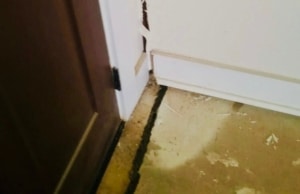
Cracks near door frame
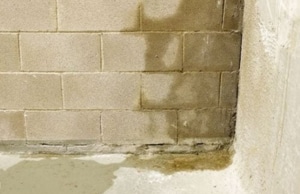
Water seeping
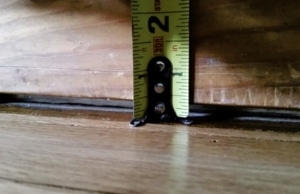
Visible gaps
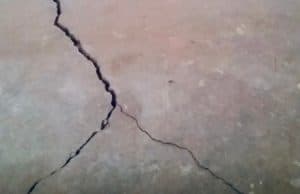
Visible floor cracks

Doors sticking
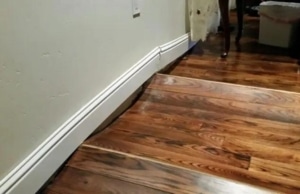
Sloping floors
What Causes Cracks in Basement Floor
There are many potential causes of cracks in basement floor. Here are some of the most common:
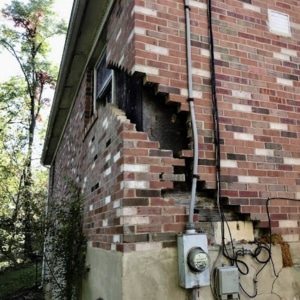
Settlement
Cracks in basement floor are often due to concrete slab settling. This occurs when your foundation’s soil is unstable and can’t support the weight of your home, causing shifting and settling. Generally, homes are made to withstand about one-eight inches of soil movement before problem signs begin to arise, while some areas start to notice issues once it’s at one-fourth inches. Settlement cracks may also form from basement leaks or tree roots.
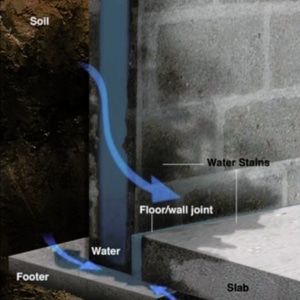
Hydrostatic pressure
As water seeps into the ground, it accumulates in the soil around your foundation. Over time, this accumulation creates hydrostatic pressure, which increases the amount of weight the foundation has to bear. The excess weight can cause the foundation to shift, and this can result in cracks appearing on the surface of your basement floor.
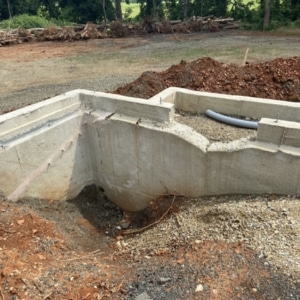
Poor construction
If your home was built using subpar construction materials or methods, it’s likely to experience issues with cracks in the foundation. The foundation could have settled unevenly, or the soil around it wasn’t properly compacted before the foundation was laid. In such cases, even slight changes in the environment could cause significant cracks in the basement floor.
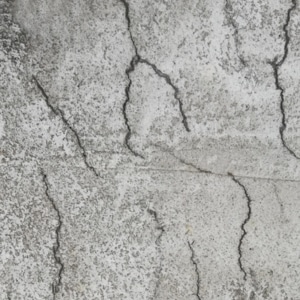
Shrinkage
Concrete consists of two main ingredients: cement and water. Upon pouring, it gradually hardens into a solid state. Shrinking occurs as the moisture evaporates during the drying process and is influenced by temperature. A drop in temperature while curing can result in cracks, while high temperatures cause the concrete to dry too quickly and also lead to cracking. Even under ideal circumstances, shrinkage will eventually affect the concrete.
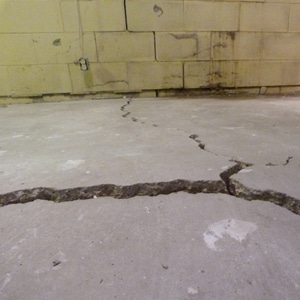
Frost Heave
In the colder seasons, frost heave can cause cracks to form on your basement floor. As the soil freezes and thaws, it expands and shifts under your foundation, causing your concrete to move and crack.
Our Solutions
If you have cracks in your basement floor, the best solution for a permanent fix is to use slab piers. Slab piers are designed to provide support to the concrete slab and raise it back to its original position. These piers are driven into the ground underneath the slab and address the underlying cause of the crack, such as soil settlement or shifting, by redistributing the weight and providing structural support.
The process of repairing a crack in a basement slab floor using slab piers starts by drilling holes through the slab and inserting the piers. Once the piers are in place, hydraulic jacks are used to raise the slab back to its original position. The space between the slab and the ground is then filled with grout to stabilize the slab and prevent further cracking permanently.
For larger voids, a polyurethane foam under the slab and the flexible sealant on the visible cracks in the floor can be used. For very large and excessive voids, flowable fill is used, which is a sand and cement base.
Slab piers and polyurethane foam are cost-effective and provide a long-lasting solution to repair basement floor cracks. They are an ideal solution for homeowners who want to avoid costly and invasive procedures. Slab piers and polyurethane foam are reliable and safe methods that can restore the function and appearance of your basement floor.
To seal minor cracks with no voids or major stress in your basement floor, cracks can be sealed with a flexible polyurethane sealant that’s able to move with the concrete, such as when it expands due to thermal expansion. Polyurethane is a versatile material that forms a durable and flexible seal, making it ideal for filling cracks in concrete surfaces. The process involves cleaning the crack thoroughly to remove any dirt or debris, and small holes are drilled into the concrete slab. Polyurethane foam is inserted into the holes and naturally expands, lifting the concrete, and then the holes are patched and smoothed.
This method offers a non-invasive and effective solution for sealing minor cracks and preventing further water infiltration in your finished living space.
Contact Us for Basement Floor Crack Repair in Northern Virginia and West Virginia
Don’t ignore the signs of foundation problems on your basement floor. Reach out to work with the best foundation repair company today to ensure the safety and longevity of your home.
At LUX Foundation Solutions, we provide proven foundation repair services in Northern Virginia, Shenandoah Valley, North Central Virginia, West Virginia, and nearby areas. We provide each customer with a free estimate before any work is done.
To schedule your free estimate, call us today at 540-508-8982 or fill out our online estimate request form for a free, on-site foundation estimate!
Request a free Estimate
FAQ's
Yes, cracks in basement floor can indicate foundation problems. However, it is essential first to determine the cause of the cracks. If the cracks are small and not accompanied by other issues, they may be caused by the natural settling of the house and can be repaired easily. But, if the cracks are wider, irregular, or accompanied by uneven floors or walls, it may indicate a more serious foundation problem that requires immediate attention.
Ignoring these signs could lead to further damage and costly repairs in the future. If you notice any signs, it’s best to consult with a professional foundation repair service to determine the root cause and address the issue before it worsens.
You should start worrying about cracks in your basement floor when certain factors are present. If the cracks are more than 1/4 inch, increasing in width or length over time, or accompanied by other signs like wall cracks, uneven floors, or doors and windows sticking, it could indicate a more significant issue.
Additionally, if you notice water seepage through the cracks or experience frequent flooding in your basement, it’s crucial to address the problem promptly. To ensure an accurate assessment, it’s recommended to consult a professional foundation inspector or structural engineer who can evaluate the severity of the cracks and provide appropriate solutions if needed.
To prevent cracks in your basement floor from worsening and causing additional foundation damage, several measures can be taken:
- Identify the root cause of the problem by having a professional foundation specialist do an inspection on your home.
- Once you’ve determined the cause, seek expert foundation repair services to address the issue. They will provide a comprehensive solution that may include repairing the existing cracks, adding reinforcement to your foundation, or waterproofing the affected area to prevent further damage.
- Ensure proper drainage around your home by directing water away from the foundation through gutters, downspouts, and grading. It’s also essential to maintain a consistent moisture level by addressing any plumbing leaks or excessive moisture issues.
- Avoid placing heavy objects directly on the floor, which can exert unnecessary pressure.
- Regular inspections and maintenance can help find and address any emerging cracks or foundation concerns early on, preventing further damage.
Yes, it is crucial to fix cracks in your basement floor. If left unfixed, these cracks can lead to water seepage, which in turn can cause damage to your property’s foundation. Also, even minor cracks can widen and worsen due to the natural settling of the building or other external factors. Furthermore, cracks can worsen over time and become a safety hazard.
By repairing the cracks promptly, you can prevent further water infiltration, mitigate the risk of structural issues, ensure your home’s safety, and maintain your property’s overall integrity and value. It is advisable to consult with a professional contractor experienced in foundation repairs to assess the cracks and provide appropriate solutions.

